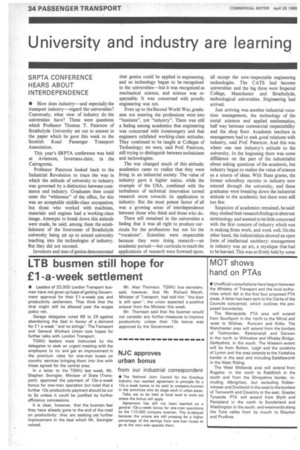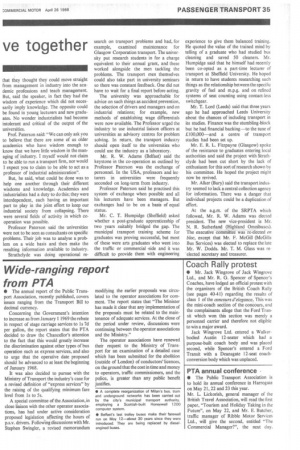University and industry are learning ye together
Page 36

Page 37

If you've noticed an error in this article please click here to report it so we can fix it.
SR PTA CONFERENCE HEARS ABOUT INTERDEPENDENCE
• How does industry—and especially the transport industry—regard the universities? Conversely, what view of industry do the universities have? These were questions which Professor Thomas T. Paterson of Strathclyde University set out to answer in the paper which he gave this week to the Scottish Road Passenger Transport Association.
This year's SRPTA conference was held at Aviemore, Inverness-shire, in the Cairngorms.
Professor Paterson looked back to the Industrial Revolution to trace the way in which the attitude of university to industry was governed by a distinction between commerce and industry. Graduates then could enter the "whiteness" of the office, for this was an acceptable middle-class occupation; but those who worked with machines, materials and engines had a working-class image. Attempts to break down this attitude were made, he said; among them the establishment of the forerunner of Strathclyde university being set up to extend university teaching into the technologies of industry. But they did not succeed.
Inventors and men of genius demonstrated
that genius could be applied in engineering, and so technology began to be recognized in the universities—but it was recognized as mechanical science, and science was respectable. It was concerned with proofs; engineering was not.
Even up to the Second World War, graduates not entering the professions went into "business", not "industry". There was still a feeling among academics that engineering was concerned with ironmongery and that engineers exhibited working-class attitudes. They continued to be taught at Colleges of Technology; we were, said Prof. Paterson, still trying to distinguish between technicians and technologists.
The war changed much of this attitude; academics came to realize that they were living in an industrial society. The value of industry gave it higher status, while the example of the USA, combined with the turbulence of technical innovation turned research more towards its application in industry. But the most potent factor of all was a growing sense of interdependence between those who think and those who do.
There still remained in the universities a feeling that it was all right to produce curricula for the professions but not for the "vocations". Scientists were respectable because they were doing research—an academic pursuit—but curricula to teach the applications of research were frowned upon, all except the now-respectable engineering technologies. The CATS had become universities and the big three were Imperial College, Manchester and Strathclyde, technological universities. Engineering had arrived.
Just arriving was another industrial vocation: management, the technology of the social sciences and applied mathematics, half way between commercial respectability and the shop floor. Academic teachers in management had to seek good relations with industry, said Prof. Paterson. And this was where one met industry's attitude to the university. In the beginning there was some diffidence on the part of the industrialist about asking questions of the academic, but industry began to realize the value of science as a source of ideas. With State grants, the former schoolboy recruits to industry now entered through the university, and these graduates were breaking down the industrial attitude to the academic; but there were still too few.
Suspicion of academics remained, he said: 'they clothed their research findings in abstruse terminology and seemed to be little concerned with the first concern of industry which was in making firms work, and work well. On the other hand, the industrialists showed an open form of intellectual snobbery: management in industry was an art, a mystique that had to be learned. This was so firmly held by some that they thought they could move straight from management in industry into the academic professions and teach management. But, said the speaker, in fact they had the wisdom of experience which did not necessarily imply knowledge. The opposite could be found in young lecturers and new graduates. No wonder industrialists had become intolerant and critical of the output of the universities, Prof. Paterson said: "We can only ask you to believe that there are some of us older academics who have wisdom enough to know that we have little wisdom in the managing of industry. I myself would not claim to be able to run a transport firm, nor would I expect you to claim to be able to act as a professor of industrial administration".
But, he said, what could be done was to help one another through their different wisdoms and knowledge. Academics and industrialists had a duty to do this; they were interdependent, each having an important part to play in the joint effort to keep our industrial society from collapsing. There were several fields of activity in which cooperation was possible.
Professor Paterson said the universities were not to be seen as consultants on specific problems. Their job was to analyse a problem on a wide basis and then make the resulting information available to industry.
Strathclyde was doing operational re
search on transport problems and had, for example, examined maintenance for Glasgow Corporation transport. The university put research students in for a charge equivalent to their annual grant, and these worked alongside the men tackling the problems. The transport men themselves could also take part in university seminars so there was constant feedback. One did not have to wait for a final report before acting.
The university was approachable for advice on such things as accident prevention, the selection of drivers and managers and on industrial relations; for example, new methods of establishing wage differentials were now available. The Professor urged the industry to use industrial liaison officers at universities as advisory centres for problem solving. In return, the transport industry should open itself to the universities who could use the industry as a laboratory.
Mr. R. W. Adams (Belfast) said the keystone in the co-operation as outlined by Professor Paterson was the exchange of personnel. In the USA, professors and lecturers in universities were frequently seconded on long-term from industry.
Professor Paterson said he practised this system of exchange when possible and all his lecturers have been managers. But exchanges had to be on a basis of equal status.
Mr. C. T. Humpidge (Sheffield) asked whether a post-graduate apprenticeship of two years suitably bridged the gap. The municipal transport training scheme for graduates was proving successful, but most of these were arts graduates who went into the traffic or commercial -side and it was difficult to provide them with engineering experience to give them balanced training. He quoted the value of the trained mind by telling of a graduate who had studied bus cleaning and saved 50 cleaners. Mr. Humpidge said that he himself had recently been co-opted as a part-time lecturer of transport at Sheffield University. He hoped in return to have students researching such things as the relationship between the specific gravity of fuel and m.p.g. and on refined systems of seat counting using contact-less switchgear.
Mr. T. Lord (Leeds) said that three years ago he had approached Leeds University about the chances of including transport in its studies. Finance was the stumbling-block but he had financial backing—to the tune of £100,000—and a centre of transport studies had been set up.
Mr. E. R. L. Fitzpayne (Glasgow) spoke of the resistance to graduates entering local authorities and said the project with Strathclyde had been cut short by the lack of enthusiasm for this sort of research shown by his committee. He hoped the project might now be revived.
Mr. Alker (Bury) said the transport industry seemed to lack a central collection agency for information. There was a danger that individual projects could be a duplication of effort.
At the a.g.m. of the SRPTA which followed, Mr. R. W. Adams was elected president. The new vice-president is Mr. N. R. Sutherland (Highland Omnibuses), The executive committee was re-elected en bloc, except that Mr. F. McGill (McGills Bus Services) was elected to replace the late Mr. W. Dodds. Mr. T. M. Glass was reelected secretary and treasurer.




















































































































